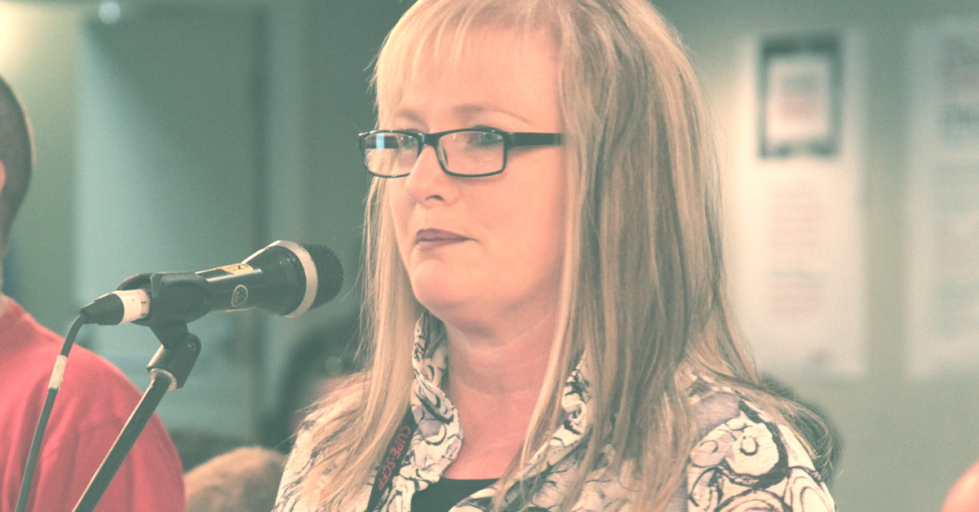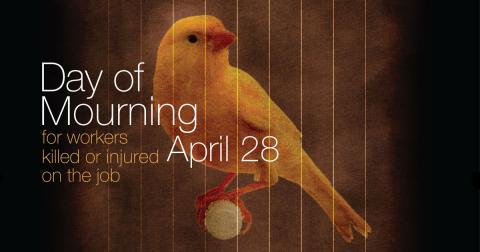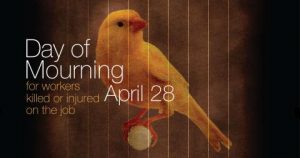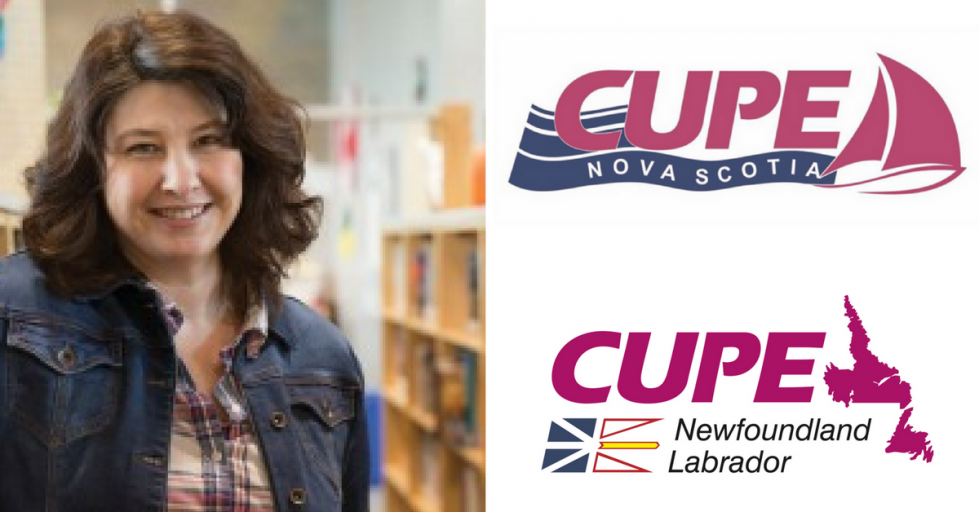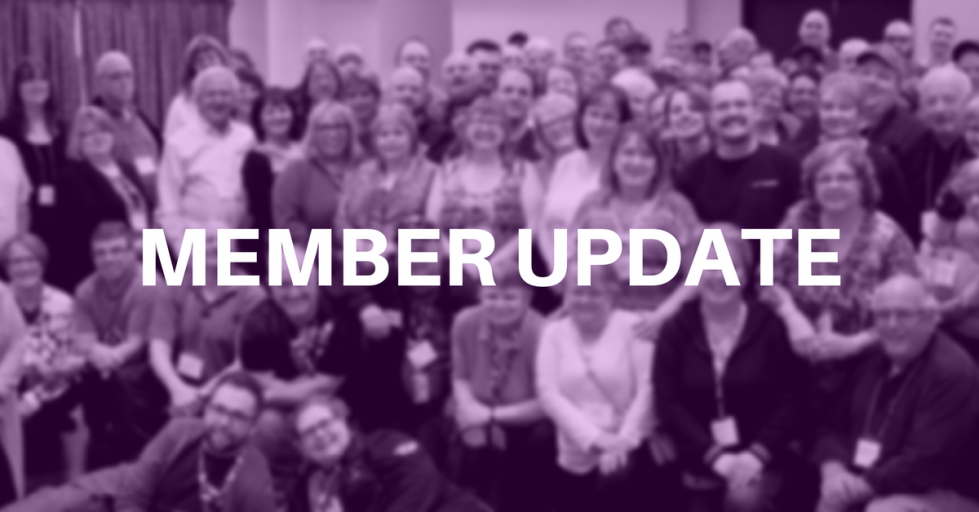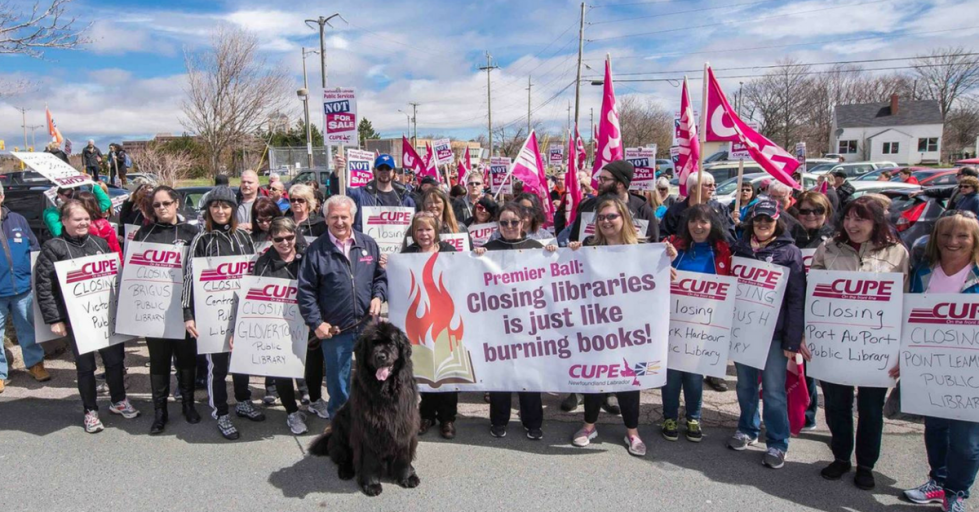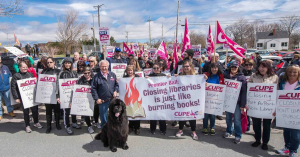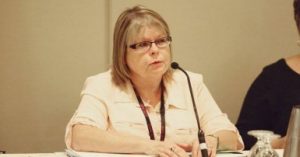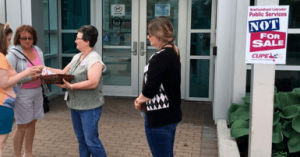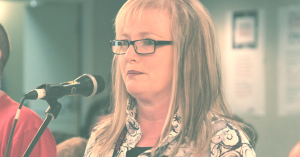 On June 5, 2018, CUPE NL President Sherry Hillier and CUPE National Researcher Carol Ferguson spoke as presenters at the Auto Insurance Review Board hearing conducted by the NL Public Utilities Board.
On June 5, 2018, CUPE NL President Sherry Hillier and CUPE National Researcher Carol Ferguson spoke as presenters at the Auto Insurance Review Board hearing conducted by the NL Public Utilities Board.
Members on the bench of the Auto Insurance Review included Chair and CEO Darlene Whalen, Commissioner Dwanda Newman, Vice-Chair of the Board, and Commissioner Jim Oxford.
The Public Utilities Board was initiated by the Government of Newfoundland and Labrador to “review and report on a number of issues with respect to automobile insurance in the province, including the reasons behind increasing claims costs for private passenger vehicles and taxi operators, and options to reduce these costs. The Board has been specifically asked to examine the impact on rates and implications for claimants of introducing a monetary cap on claims for non-economic loss for minor/mild injuries or continuing with the current deductible of $2,500 or increasing the deductible.”
The hearings are scheduled from June 4 to June 14, 2018, and may be extended if necessary.
Other parties at the hearing included the Consumer Advocate, the Atlantic Provinces Trial Lawyers Association, the Campaign to Protect Accident Victims, Spinal Cord Injury NL, and the Insurance Bureau of Canada.
All information and documents filed in the review will be placed on the record and on the Board’s website, including CUPE NL’s written submission. Transcripts of the hearing will be distributed electronically to the parties and will also be posted on the website.
CUPE NL supports the development of a publicly owned, full service, non-profit automobile insurance system to deliver comprehensive, no-fault insurance to all licensed drivers in the province, including private passenger drivers, independent commercial owner-operators and fleet company drivers (such as trucking, courier, and taxi companies) at fair, non-discriminatory rates.
CUPE NL excerpt from the transcript dated June 5, 2018
Sherry Hillier: Thank you, Board. I’m Sherry Hillier. I’m the newly-elected president of CUPE Newfoundland and Labrador, taking over the position of former president, Wayne Lucas.
Carol Ferguson: Good morning. Carol Ferguson. I am the research representative for the Atlantic Region of CUPE.
Sherry Hillier: Good morning. I’d like to thank the Board for the opportunity to speak to you today about automobile insurance. CUPE is the largest union with more than 650,000 members across the country. Our 6,300 members in Newfoundland and Labrador would, in various sectors, include health care, post-secondary K to 12 education, municipalities, housing, social services, libraries among others. CUPE Newfoundland and Labrador’s members are proud to provide services which support the development of vibrant healthy communities and strong local economies.
CUPE Newfoundland and Labrador believes this review provides a valued opportunity to explore the possibilities of creating an improved automobile insurance system for the province. Instead of just tinkering with the existing system by tweaking the rates, adjusting the profits, moving the caps up and down, why not seize the opportunity to fix the problem once and for all?
CUPE recommends the creation of a publicly-owned non-profit automobile insurance that can offer fair, non- discriminatory rates and high-quality coverage for all licensed drivers, including private passenger drivers, independent commercial owner/operators, and drivers for fleet companies such as trucking, courier and taxi companies. By implementing a public auto insurance plan, Newfoundland and Labrador would become the fifth province within Canada to have a publicly-owned publicly-operated system of automobile insurance. British Columbia, Saskatchewan, Manitoba and Quebec have enjoyed the benefits of public auto insurance for many decades under governments of various political stripes. Newfoundland and Labrador would be in the enviable position of being able to learn from experiences of other jurisdictions to design costs to implement made in Newfoundland and Labrador full service system to meet the vehicle insurance needs of the people of our province. CUPE Newfoundland and Labrador believes a public auto insurance plan makes good sense both economically and socially for our province.
Today, I want to outline why we reached this conclusion and invite anyone looking for more detailed information to read our submission to the Public Utilities Board Automobile Insurance.
First of all, it is important to remember drivers are required by legislation to purchase automobile insurance. It isn’t an option. It isn’t like we’re going to decide if we’re going to buy a coffee or not. Driving without insurance is a very serious offence and severe penalties which may include heavy fines and suspension of a driver’s licence. Legislation requiring automobile insurance means private insurance companies have a captive market.
Because governments require drivers to purchase automobile insurance, CUPE believes that governments have a responsibility to ensure that benefits are fairly delivered at a reasonable cost. Insurance premiums in Newfoundland and Labrador are among the highest in the country. Newfoundland and Labrador was ranked tenth out of 13 jurisdictions in insurance premium rates in 2017.
[An] Ontario report commissioned by the Minister of discriminatory rates and high-quality coverage for all licensed drivers, including private passenger drivers, independent commercial owner/operators, and drivers for fleet companies such as trucking, courier and taxi companies.
By implementing a public auto insurance plan, Newfoundland and Labrador would become the fifth province within Canada to have a publicly-owned publicly-operated system of automobile insurance. British Columbia, Saskatchewan, Manitoba and Quebec have enjoyed the benefits of public auto insurance for many decades under governments of various political stripes.
Newfoundland and Labrador would be in the enviable position of being able to learn from experiences of other jurisdictions to design costs to implement made in Newfoundland and Labrador full-service system to meet the vehicle insurance needs of the people of our province. CUPE Newfoundland and Labrador believes a public auto insurance plan makes good sense both economically and socially for our province.
Today, I want to outline a finance [report] titled “Clear Benefits Fairly Delivered: A Review of the Auto Insurance System in Ontario.” This comprehensive report compared current provincial auto insurance premiums for private passenger vehicles in each province and territory. It supports what ordinary citizens are saying, “Auto insurance rates in this province are too high.”
In 2016, drivers in Newfoundland and Labrador paid approximately $434 million in premiums and received approximately $334 million in claims.
This information filed is with the Superintendent of Insurance.
The premiums exceeded disbursement payments for direct claims for almost $100 million dollars. Private companies used this $100 million dollars, presumably, to cover operating costs such as staff, offices, promotions, broker fees and other profits—other expenses including profits.
Four companies have a stranglehold on the insurance in Newfoundland and Labrador. Ninety-five per cent of auto insurance services are provided by approximately 16 insurers. When common ownership among these are factored in, only four companies provide approximately 84 per cent of the automobile insurance business. The automobile insurance industry in Newfoundland is profitable and monopolized.
Most of the capital generated by auto insurance sectors—sector does not stay in the province. The head offices for most of these companies are 11 located elsewhere. The profits go directly the companies’ shareholders. Under a publicly-owned and administered system, that considerable business capital generated by insurance premiums could be invested here to support the goals of the people of Newfoundland and Labrador.
Private insurance systems tend to be ineffective. Disputes lead to a very high percentage of premiums being used to pay experts and lawyers and not going directly to the injured persons. Business costs for private insurance systems include duplication, competitive market and profits. The province pubic insurance—insurers of British Columbia, Quebec, Manitoba and Saskatchewan do not charge higher premiums than those of private insurers in other provinces.
In fact, the public insurance tends to offer rates which are often lower than or at least comparable to rates in other provinces.
Public automobile insurance companies have attributed their ability to offer a good insurance product at a lower premium due to the following factors.
- The not-for profit nature of their mandates. Insurance Corporation of British Columbia, ICBC, became the exception following an amendment to its legislation in 2010.
- Reduced administration costs due to the greater efficiencies and economies of scale.
- Lower marketing costs due to the monopoly status of mandatory insurance coverage.
- Reduced high-cost claims because of the effectiveness of their road safety and
- Driver improvement programs.
While premium rates are important when considering the value of public insurance systems, there are other facts which contribute to the effectiveness of insurance plans, including the quality of the insurance product, reliability of service, capacity of the capital to remain within the province, et cetera.
The four public auto insurance plans vary from province to province, but they share many common factors including:
- All Crown corporations with similar core values. They [are] the sole providers of the mandatory auto mobile insurance plan within their respective provinces.
- They are responsible for driver licensing, vehicle registration, and play a leading role in education programs and road safety and driver improvement.
- They provide the mandatory insurance coverage and mandatory minimum amount of all vehicles registered by residence with valid driver’s licences in their respective province.
- Because public insurance companies are required to insure all legal drivers in their respective province, they use the driving record of the individual and not that of his or her peer group to calculate the individual premium levels.
All drivers in Manitoba and Quebec are required to purchase public automobile insurance as a part of their annual driver’s licence fee. Rate increases in Saskatchewan, Manitoba and British Columbia must be approved by the public regulators.
In Quebec, the base rate of mandatory public auto insurance is set out by the provincial statute. Brokers provide the main point of contact for consumers looking to purchase auto insurance in their local communities.
While there are many commonalities, there are also differences among the public insurance plans of each province including:
- Public auto insurers in Canada have historically operated on a not-for-profit basis. The recent exception is ICBC whose legislation was amended in 2010 permitting the provincial government to compel ICBC to pay dividends into the provincial treasury. ICBC is the only for-profit public auto insurance provider in Canada.
- British Columbia is the only province with a public auto insurance program, which operates solely with a tort-based system.
- Manitoba system operates on a pure no-fault model.
- Saskatchewan is the only province that offers motorists a choice between no-fault and tort systems of insurance. With the introduction of tort option coverage in 2003. SGI coverage offered an opportunity for claimants who selected the tort option to go through the courts to sue for damages like for pain and suffering.
- In Quebec—in the Quebec system, public auto insurance is limited to coverage of personal injuries while damage to property is covered by the private insurer.
Each provincial public auto insurance system offers special products, which have evolved over time to meet the needs of their respective clients. The salutation to a high cost of auto insurance is not to reduce the benefits. Fair benefits must be taken as the starting point in any insurance system.
The solution lies with the developing a non-profit auto insurance system that operates under public scrutiny.
CUPE Newfoundland and Labrador urges the Public Utilities Board to use the [recommendation] to the Government of Newfoundland and Labrador to form a task force to develop a publicly-owned made-in Newfoundland and Labrador full-service not-profit automobile insurance model.
The task force’s responsibility will be to identify the key elements of the proposed model, start-up costs and implementation time. The model will continue—will outline a comprehensive no-fault plan to provide all licenced drivers in the province including private insurance passenger drivers, independent commercial owner/operators, and fleet company drivers with access to a mandatory automobile insurance coverage at fair, non-discriminatory rates.
In creating a made-in Newfoundland and Labrador public automobile insurance model, the task force can draw on the experiences of British Columbia, Quebec, Manitoba and Saskatchewan, as well as the exploratory research undertaken by New Brunswick, Nova Scotia and Ontario. CUPE recommends that a not-profit crown corporation created to operate at arm’s length from the provincial government and to utilize independent brokers.
The Crown’s corporation’s mandate should include the provision of vehicle registration, driver’s licence and a mandatory auto insurance. The public auto insurance system created in Newfoundland and Labrador is expected to be financially self-sustaining and to operate on a break-even basis calculated over time.
Beyond the initial start-up loan to be paid back in a timely manner, the Crown corporation will not receive money from, nor pay dividends to, the government.
In its corporate values and operating practices, the auto insurance model should reflect Newfoundland and Labrador’s commitment to independence, fairness and prosperity for all.
Thank you.

